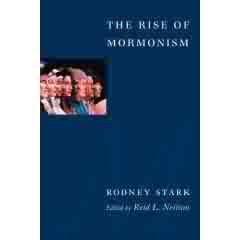 I have been fortunate recently to establish a relationship with Gerald McDermott of Roanoke College. Dr. McDermott has written a number of interesting things in the area of a theology of religions, and I find his perspective and approach of interest, and worthy of further exploration, both for the disciplines of theology and missiology. Of particular interest to me was his book Can Evangelicals Learn From World Religions: Jesus, Revelation & Religious Traditions (IVP, 2000). He has a new book coming out titled God's Rivals: The Challenge of Other Religions in the Bible and the Early Church. I don't have the publishing information, but I have been privileged to see an advance draft, and the book contains many interesting theological gems for missiological consideration and exploration.
I have been fortunate recently to establish a relationship with Gerald McDermott of Roanoke College. Dr. McDermott has written a number of interesting things in the area of a theology of religions, and I find his perspective and approach of interest, and worthy of further exploration, both for the disciplines of theology and missiology. Of particular interest to me was his book Can Evangelicals Learn From World Religions: Jesus, Revelation & Religious Traditions (IVP, 2000). He has a new book coming out titled God's Rivals: The Challenge of Other Religions in the Bible and the Early Church. I don't have the publishing information, but I have been privileged to see an advance draft, and the book contains many interesting theological gems for missiological consideration and exploration.Dr. McDermott also brought an article he wrote to my attention titled "Testing the Stark Thesis: Is Mormonism the First New World Religion Since Islam?" The article is published in the new edition of Books & Culture. The article critiques the claim of sociologist Rodney Stark that Mormonism will become the next major world religion. McDermott begins his article with consideration of whether Mormonism constitutes a new religion, or a new religious tradition sufficiently different from traditional Christianity to warrant a separate classification. He then discusses the question of whether Mormonism constitutes a world religion, and along the way notes the difficulties in defining the concept. After offering something of a functional definition of "world religion," McDermott then discusses whether Mormonism is the first such religion to arise since Islam, and notes that several others have arisen since the seventh century, and with far more adherents, such as True Pure Land Buddhism. In this section of his argument, McDermott contrasts The Watchtower Bible and Tract Society with the LDS Church using Stark's ten marks of a major world faith, and after noting a brief parity between the groups he concludes this section by stating: "Because the Witnesses have planted communities in 88% more countries, and are not as associated theologically with America in this increasingly anti-American world, their prospects for further growth might be a little better."
McDermott then concludes his critique by considering the "translatability" of traditional Christianity in its worldwide expansion as contrasted with Mormonism. McDermott interacts with leading scholars in the area of world Christianity studies, including Andrew Walls and Lamin Sanneh, and notes that through Christianity's history it has been enormously adept at translating its core concepts within the cultural frameworks of new cultures. By contrast, McDermott notes that Mormonism suffers from many obstacles to cross-cultural translation, with the exceptions of the South Pacific and Latin America. McDermott believes that this lack of cross-cultural translatability, coupled with its lack of a formal theology, will hamper any possibilities for Mormonism to become a world religion.
This article does not appear to be available at Books & Culture electronically, but the article contains some good information that make a hard copy worth finding and reviewing.
No comments:
Post a Comment